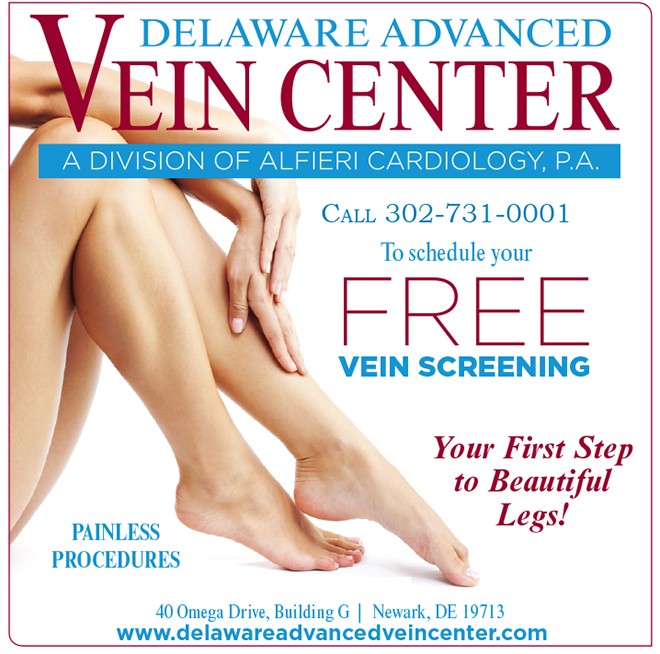How Do I Treat My Varicose/Spider Veins?

By Anthony Alfieri, DO, FACC
At the Delaware Advanced Vein Center, we treat both varicose and spider veins in an office setting as outpatient. The Delaware Advanced Vein Center specializes in personalized care and works with you within every step in the process. The first step is to determine what is causing the varicose and spider veins. These may be a symptom of venous insufficiency, which is a disease where the one-way valves in the veins are incompetent and may lead to discoloration, bleeding, ulcers and a “heavy leg” sensation that may hinder daily activity.
If you experience any of these symptoms, it would be recommended you undergo a venous ultrasound to document this objectively. The venous ultrasound will check the circulation of the vein valves by measuring the blood flow in the valves opening and closing and this will determine the level of reflux you may have. If you have venous insufficiency, the ultrasound results will help determine if your insurance will cover the procedure to fix the problem.
If your venous ultrasound shows reflux, we will make sure conservative efforts are utilized to avoid any surgical procedure if possible. If conservative efforts are not useful or helpful than a simple painless ten-minute ablation could be performed which would be curative. There are different kinds of ablation procedures, we typically recommend radiofrequency to treat. A thin catheter is inserted into the vein under local anesthetic. The slender catheter delivers radiofrequency (RF) energy to the catheter, which heats the vein wall. As the vein wall is heated and the catheter is withdrawn, the collagen in the wall shrinks and the vein closes. Once the diseased vein is closed, blood is re-routed to other healthy veins. This treatment is an outpatient procedure done in our Omega office.

If your venous ultrasound did not show reflux, the doctor would recommend treating the spider veins with sclerotherapy. The procedure consists of the doctor inserting a tiny needle into the veins and then injecting a solution known as a sclerosant. It irritates the lining of the veins, which triggers them to collapse. Once they collapse, the body reabsorbs them. This eliminates the appearance of veins on the outside of the skin and will reduce the pain caused by veins. The potency and type of sclerosant varies based on the size and location of the veins. Ultimately, this treatment helps patients to eliminate the problem early on before the spider veins cause very unpleasant effects. This treatment is done in the doctor’s office.
There is no down time after this procedure is performed. Patients are able to walk and resume their normal daily activities immediately following the procedure. They may experience some temporary bruising and swelling in the treatment area. When the compression bandages are removed in a few days, patients are usually advised to wear compression stockings for several weeks to facilitate healing. Other than that, and keeping the area clean, no post-op care is required by the patient.
If you are experiencing pain, swelling or other symptoms of varicose veins or spider veins, call today at 302-731-0001 to schedule an ultrasound. We can walk you through the process and get you on your way to healthier legs!
Anthony Alfieri, DO, FACC is a board certified interventional cardiologist, who has been practicing in the New Castle County area for over 25 years. His efforts to improve the quality of life for all individuals – both men and women alike – who suffer from the effects of venous insufficiencies continues with the formation of Delaware Advanced Vein Center. Dr. Alfieri has found that for many people, having varicose veins is needlessly limiting and it is a common misconception that the treatment of varicose veins is painful and not worth the effort. So as to provide better care for his patients, Dr. Alfieri is now performing radiofrequency ablations.
Intersocietal Commission for the Accreditation of Vascular Laboratories:
The purpose of ICAVL is to ensure high quality patient care and to promote health care by providing a mechanism to encourage and recognize the provision of quality noninvasive vascular diagnostic testing by a process of voluntary accreditation.
Intersocietal Commission for the Accreditation of Nuclear Medicine Laboratories:
The purpose of ICANL is to ensure high quality patient care and to promote health care by providing a mechanism to encourage and recognize the provision of quality nuclear cardiology and nuclear medicine diagnostic evaluations by a process of voluntary accreditation.
Intersocietal Commission for the Accreditation of Echocardiography Laboratories:
The purpose of ICAEL is to ensure high quality patient care and to promote health care by providing a mechanism to encourage and recognize the provision of quality echocardiographic diagnostic evaluations by a process of voluntary accreditation.
Headshot by Shannon Adelson of Adelson Media, Inc.


